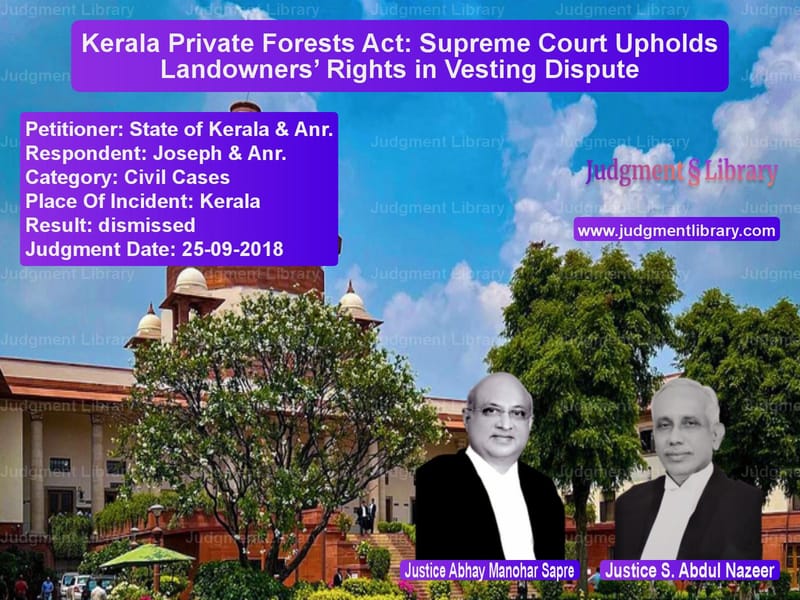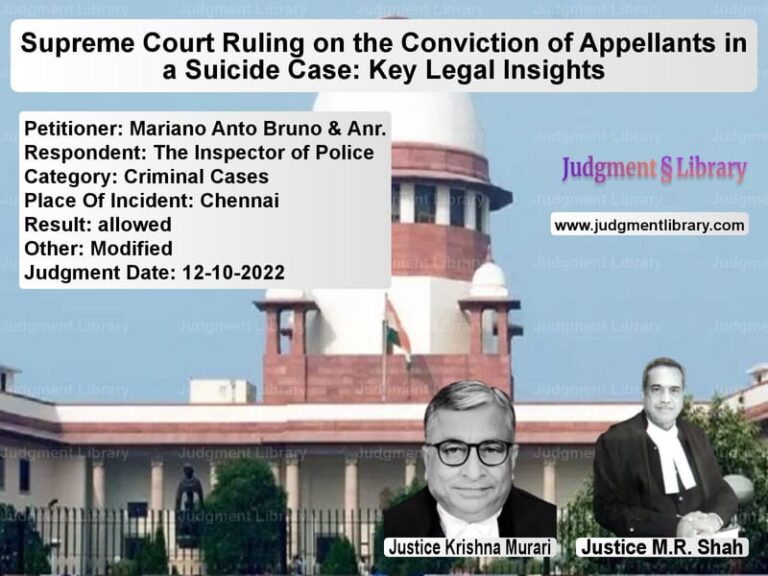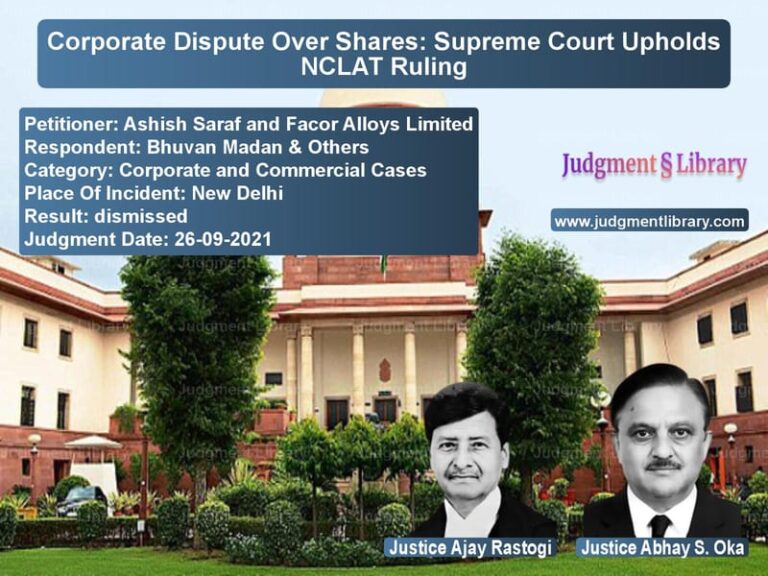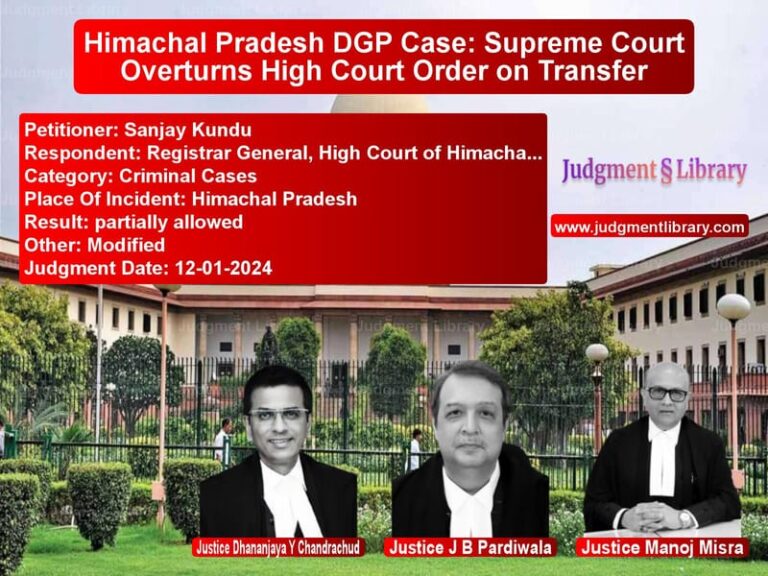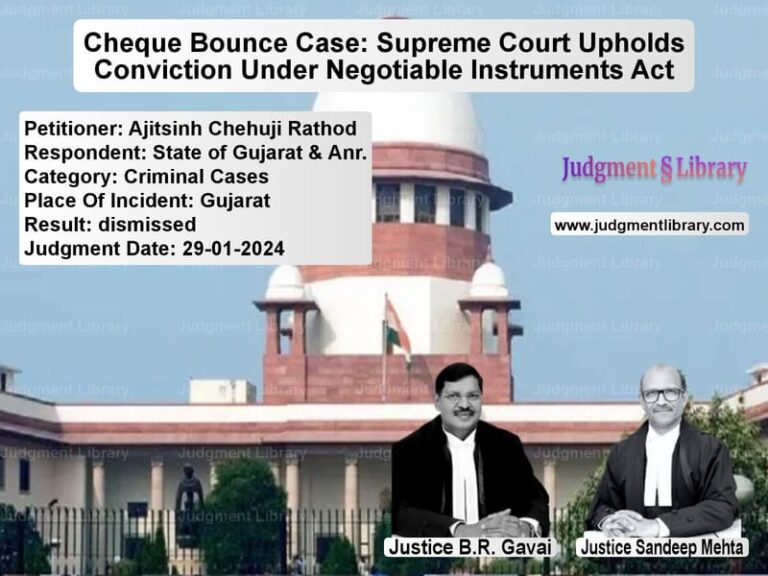Kerala Private Forests Act: Supreme Court Upholds Landowners’ Rights in Vesting Dispute
On 25th September 2018, the Supreme Court of India delivered an important ruling in State of Kerala & Anr. v. Joseph & Anr., addressing the rights of landowners under the Kerala Private Forests (Vesting and Assignment) Act, 1971. The case revolved around whether private land, used for cultivation and owned before the appointed date, could be exempted from vesting under the Act.
The Supreme Court upheld the rights of the respondents (landowners), reaffirming that land intended for personal cultivation prior to the Act’s cut-off date should not be forcibly vested in the State. This judgment strengthens legal protections for private landowners in Kerala against wrongful government claims over their property.
Background of the Case
The respondents, Joseph & Anr., owned 14 acres of land in Thenkara Village, Kerala. This land was part of a larger estate purchased by their family, which included rubber plantations and other cultivated trees.
The key legal issue was whether this 14-acre land was a private forest under the Kerala Private Forests (Vesting and Assignment) Act, 1971 (hereinafter referred to as “the Act”), and thus vested in the State, or whether it was protected under Section 3(3) of the Act, which exempts land intended for personal cultivation.
The respondents had earlier approached the Forest Tribunal, which ruled in their favor. However, the State of Kerala challenged this decision before the Kerala High Court, which overturned the Tribunal’s ruling. The respondents then approached the Supreme Court.
Legal Issues and Key Questions
The Supreme Court considered the following issues:
- Did the respondents’ land qualify as a private forest under the Act?
- Was the land exempt from vesting under Section 3(3) of the Act?
- Did the respondents establish their intent to cultivate the land before the cut-off date?
- Was the Kerala High Court correct in reversing the Tribunal’s findings?
Arguments by the Appellant (State of Kerala)
The State of Kerala, represented by Senior Counsel K.N. Balgopal, argued:
- The land in question was a private forest and thus automatically vested in the government under the Act.
- The respondents failed to prove that the land was intended for cultivation before the appointed day, i.e., 10th May 1971.
- The Tribunal’s decision was erroneous because it did not apply the correct legal standard for exemption under Section 3(3) of the Act.
- The Kerala High Court was correct in ruling that the land vested in the State.
Arguments by the Respondents (Joseph & Anr.)
The respondents, represented by Senior Counsel R. Basant, countered:
- The land had been purchased legally and was already being used for rubber plantations and other cultivated crops.
- The Act specifically exempts private land intended for cultivation, and their land met this criterion.
- The Forest Tribunal correctly ruled in their favor based on substantial evidence, and the Kerala High Court wrongly interfered with this finding.
- Their land should not be forcibly taken by the government when it was lawfully owned and cultivated.
Supreme Court’s Observations
The Supreme Court, comprising Justice Abhay Manohar Sapre and Justice S. Abdul Nazeer, closely examined the provisions of the Act and the evidence presented.
The Court ruled:
“The Tribunal’s findings were based on substantial evidence, including proof that the respondents had acquired the land before the appointed date and had used it for cultivation.”
The Court further emphasized:
“For the purpose of exemption under Section 3(3), it is not necessary that the entire land should have been cultivated before the cut-off date. The intention to cultivate, supported by evidence of systematic development, is sufficient.”
The Court rejected the Kerala High Court’s decision, stating:
“The High Court wrongly ignored the Tribunal’s findings and failed to apply the settled legal principles regarding exemption from vesting.”
Final Judgment
The Supreme Court upheld the respondents’ rights, ruling:
“The land in question is exempt from vesting under Section 3(3) of the Act. The State’s appeal is dismissed, and the respondents shall retain ownership of their property.”
Impact of the Judgment
This ruling sets an important precedent for landowners in Kerala, affirming that private land cannot be arbitrarily taken by the government under the pretext of forest conservation. Key takeaways include:
- Legal protection for landowners: Land intended for cultivation before 10th May 1971 cannot be forcibly vested in the State.
- Importance of documentary evidence: Landowners must provide proof of their intent to cultivate, but actual cultivation of the entire land is not mandatory.
- Judicial review of government claims: Courts must scrutinize government assertions that land is forest property.
- Strengthening land rights: The judgment reinforces that legitimate property owners cannot be deprived of their land without due process.
This decision is a significant victory for landowners in Kerala and reinforces constitutional protections against arbitrary state action.
Petitioner Name: State of Kerala & Anr..Respondent Name: Joseph & Anr..Judgment By: Justice Abhay Manohar Sapre, Justice S. Abdul Nazeer.Place Of Incident: Kerala.Judgment Date: 25-09-2018.
Don’t miss out on the full details! Download the complete judgment in PDF format below and gain valuable insights instantly!
Download Judgment: State of Kerala & An vs Joseph & Anr. Supreme Court of India Judgment Dated 25-09-2018.pdf
Direct Downlaod Judgment: Direct downlaod this Judgment
See all petitions in Property Disputes
See all petitions in Landlord-Tenant Disputes
See all petitions in Specific Performance
See all petitions in Judgment by Abhay Manohar Sapre
See all petitions in Judgment by S. Abdul Nazeer
See all petitions in dismissed
See all petitions in supreme court of India judgments September 2018
See all petitions in 2018 judgments
See all posts in Civil Cases Category
See all allowed petitions in Civil Cases Category
See all Dismissed petitions in Civil Cases Category
See all partially allowed petitions in Civil Cases Category

